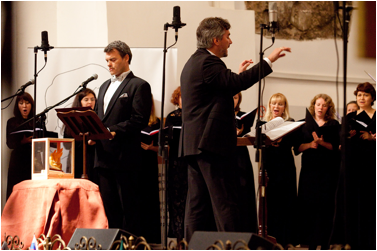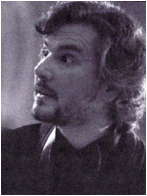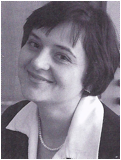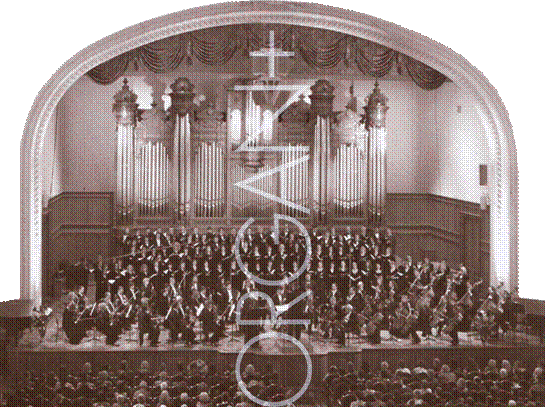
The Moscow Synodal Choir "LIVE"

The Moscow Synodal Choir with Alexei
Puzakov conducting and Evgeney Dyatlov reciting of Gospel
Olga Ushakova (Soprano), Olga Nadezjdina
(Alto), Viacheslav Zikov
Tenor), Rodionov Vasenkin
(Bass)
The Synodal Choir, one of the oldest professional
choirs in Russia, was founded in Moscow in 1721. The members of the Synodal Choir were mainly from the Patriarchal Choir of
singing deacons, which emerged in the 16th century. Initially the
Patriarchal choir singers included only male clergy. Until the middle of the 17th
century, the singing was monophonic, but later the choir began to perform
polyphonic songs with children's voices becoming included (sopranos and altos).
After the abolition of the patriarchate in 1700, the choir
became known as a "cathedral" one and was attached to the Dormition
Cathedral of the Kremlin. Following the establishment of the Holy Synod in
1721, it was transferred to its department, re-dubbed "Synodal".
During the 17th and 18th centuries, patriarchal singers, and later
the Synodal Choir were in parallel and competed in
level and mastery of performance with court singing deacons, renamed the Court
Chapel under Peter I and transferred to St. Petersburg.
Choristers from the Cathedral of Christ the Saviour, the Church
of the Exaltation of the cross, the Church of St. George, St. Nicholas Nunnery,
Church of the Nativity of the Blessed Virgin Mary, the Church of the Archangel
Gabriel and others also take part in the joint choir of the Kaliningrad
diocese.
At the turn of the 19th and 20th
centuries, the choir repertoire had expanded to include secular music and
variations of Russian folk songs. Many Moscow composers wrote specifically for
the Synodal Choir. Pyotr Ilyich Tchaikovsky was actively engaged in the choir's
activities in his day. In 1917 after the restoration of the patriarchate in
Russia, the choir had preserved its name which by then
had become historical. At the Easter of 1919, the Kremlin cathedrals were
closed, the Synodal College was dissolved, and the
choir ceased to exist.
The present-day Moscow Synodal Choir,
began its revival in the spring of 2009, with the appointment of Metropolitan Hilarion of Volokolamsk, the
rector of the Joy of All Who Sorrow Church. The Synodal
Choir is being revived on the basis of the choir of the joy of All Who Sorrow
Church on Bolshaya Ordynka
Street in Moscow, where since 1948 the traditions of Moscow church school of
singing was preserved under the direction of the choir director Nikolai Matveyev.
A number of recordings of Russian religious music were produced
and published over the course of several years, under N. Matveyev's
supervision. Alexei Puzakov became one of the
directors of the All Who Sorrow Church. After the death of N. Matveyev in 1993, many of the traditions laid down by him
were discontinued; the choir music library was lost and the choir was greatly
discontinued; becoming a chamber singing ensemble.
In recent years, taking over the duties as choir director in the
revived Sorrow church choir, Alexei Puzakov has been
able to combine the creative efforts the of 80 singers. In addition to participating
in ceremonial liturgies, the Moscow Synodal Choir
gives concerts in Moscow, Russia and abroad. The Choir collaborates with the
Russian National Orchestra and the Tchaikovsky Bolshoi Symphony Orchestra,
takes part in the Easter Festival program, and participates in important
international church projects. The head of the Moscow Synodal
Choir is Alexei Puzakov, Honored
Artist of Russia, and the Choirmaster Olga Ushakova,
Associate Professor of Choral Conducting and winner of international
competitions.
|
Organ version of St. Matthew Passion
The idea of an arrangement of
St Matthew Passion for choir and solo organ belongs to the author of
the work, the Metropolitan Hilarion (Alfeyev) of Volokolams. In January
2010, the reverend Hilarion posed the
question of whether such an adaptation is possible to create without
causing the Passion to loose its defining characteristics. The
arrangement took almost 9 months to complete. The main objective
was, on the one hand, to retain the specific features of the
author's intent in each of the parts and the whole, while on the
other hand, to give what had originally been a string orchestra
piece a set of features fitting in with the sound and flow of organ
music. |
|

Choir of
Kaliningrad Diocese leader Alexey Rodionov,
Tatiana Scherba, Organ
 |
Alexei Puzakov
Ė
distinguished Artist of Russia, creative director and conductor of the Moscow Synodal Choir. An heir to the traditions of the Russian
school of religious music, he has endeavoured to preserve and perpetuate these
traditions. A prominent feature of the Russian school is its aspiration to
combine sublime artistic skill with a pious attitude towards words and the
manner in which words are delivered through music. The sound of the choir is
characterized by a high level of vocal mastery and a striving towards a perfect
ensemble, as well as performing clear and convincing renditions. For several years, Alexei Puzakov was the scriptwriter, musical director, and stage director of the annual award ceremony of the International Fund for the Unity of Orthodox Nations at the Church Assembly Hall of the Cathedral of Christ the Saviour. The Russian Orthodox Church has decorated him with the Order of the Venerable Sergius of Radonezh and the Order of Saint Innocent of Moscow. |
|
Tatiana Scherba
Belarus-Austria, graduated with distinction from the Belarusian
Lyceum of the Belarusian Academy of Music specializing in Theory of Music, the
Tchaikovsky Moscow State Conservatory and post graduate study specializing in
musicology (Prof. Yu.N. Holopov) and "Organ" (Prof. S.L. Dizhur, N.N. Gureeva), the Higher
School of Music in Freiburg, Germany, specializing in organ music (Prof. K. Shnorr) and the
University of Music and Fine Arts in Vienna in organ concert performance (Prof. M. Hazelboek. Ms. Scherba is a laureate of
international competitions and a winner of several scholarships in Germany,
Switzerland and Japan. Since 1995 she has been active as concert organist.
Since 2007 she is Regent of the St. Nicholas Cathedral in Vienna. At the request
of Bishop Hilarion in 2010 she made the organ
transcription of "St. Matthew Passion". |
|
|
|
The Moscow Synodal
Choir "LIVE"
Olga Ushakova (Soprano), Olga Nadezjdina
(Alto), Viacheslav Zikov (Tenor),
Rodionov Vasenkin (Bass)
Tatiana Scherba,
Organ
Performing
St. Matthews – Passion by Metropolitan Hilarion
(Alfeyev)
|
1.
2.
3.
4.
5.
6.
7.
8.
9.
10.
11.
12. |
"Come let us sing a holy lament to Christ"
The Moscow Synodal Choir |
04:25
03:26 |
|
download
digital quality
|



